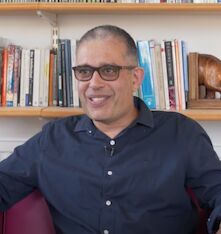The recent UNESCO report 'Reimagining Our Futures Together: A New Social Contract for Education' places education at the heart of efforts to create more just and sustainable futures for people and for the planet.
A new social contract for education must be based on a plurality of voices, ways of knowing the world and visions for the future. It must aim at making education more responsive to the urgent challenges of climate change and unsustainable development. This, in turn, involves transforming research through knowledge co-creation and equitable partnership between researchers in the Global North and South and researchers based in universities and practitioners, policymakers, community and non-governmental organisations.
The work of this Chair
This Chair is based in the Centre for International and Comparative Education (CIRE) at the University of Bristol. The work that they carry out involves collaboration with a vast network of international peers throughout South Africa, Rwanda, Somalia, India, Ethiopia, Tanzania and the Netherlands.
The Transforming Education for Sustainable Futures Network was organised under the auspices of the Chair and funded through the UKRI Global Challenges Research fund, demonstrating the power of knowledge co-creation and equitable partnership working. It funded 67 projects in India, Rwanda, South Africa and Somalia/Somaliland that empowered disadvantaged communities to imagine how education can contribute to sustainable livelihoods, sustainable cities and communities and climate action.
A central focus for the work of the Chair has been to lead efforts to decolonise education at the University of Bristol and globally. You can access a FutureLearn course developed with colleagues at Bristol on Decolonising Education: From theory to practice. An edited collection of essays on Decolonising Education for Sustainable Futures explores the links between demands to decolonise education and struggles for more sustainable futures.
The Chair has also co-produced with educators in the global South a book on Teacher Professionalism in the Global South: A decolonial perspective, which seeks to foreground the lived experiences and perspectives of educators working in some of the most challenging delivery contexts around the world. The Chair will continue to foreground the voices and perspectives of groups that have been historically marginalised in existing knowledge hierarchies and in research, including girls and women, Indigenous and other racialised and minoritised groups. The work of the Chair will maintain a focus on Africa to reflect UNESCO’s strategic priorities.
Specifically, the Chair will:
- mobilise capacity amongst researchers in Africa and Bristol to undertake research into just and sustainable futures based on principles of knowledge co-creation and equitable partnership working.
- support efforts at Bristol and in Africa to transform education through processes of decolonising the curriculum and aligning curricula to better meet the urgent challenges of unsustainable development.
- stimulate debate and to facilitate knowledge exchange within UNESCO, the UNESCO Chairs/ UNITWIN programme and the HE sector on transforming knowledge and research for just and sustainable futures.
About the Chair Lead

Leon Tikly is Professor in Education at the University of Bristol and co-directs the Centre for International and Comparative Education (CIRE) in the School of Education. Initially starting his career as a science teacher, he has taught throughout London as well as abroad in Morocco and Tanzania.
Professor Tikly worked as a policy researcher at the Education Policy Unit, University of the Witwatersrand during the transition period between apartheid and democracy in South Africa. It was here that he drove the formulation of their new education policies on a national level. Leon’s skills and experiences both within schools and as a policymaker means that he has a unique perspective and network of collaborators. He still teaches at postgraduate level on the Med (Master of Education), and regularly in Hong Kong as part of Bristol’s EdD Programme.
Professor Tikly is a Fellow of the Academy of Social Sciences and has recently directed a UKRI-funded network plus on Transforming Education for Sustainable Futures with partners in India, Rwanda, Somalia/ Somaliland and South Africa (UKRI; £4.75 million; 2019-23). His scholarship over many years has focused on globalisation and education policy in the postcolonial world and on initiatives to improve the quality of education for disadvantaged learners, particularly in Africa.
Between 2005-11 Professor Tikly directed a research programme consortium on Improving Education Quality in Low Income Countries (EdQual) (DfID; £2.5 million). He has also conducted a number of research projects and written extensively on issues of race, ethnicity and education in the UK and globally.
More recently he has written at the intersection between decolonial scholarship and education for sustainable futures. His work is informed theoretically by critical realism, postcolonial and decolonial perspectives and is underpinned by a commitment to social, environmental and epistemic justice.






